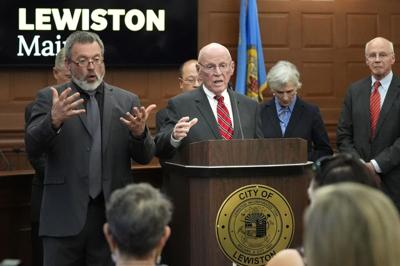LEWISTON, Maine (AP) — Both the Army Reserve and police missed opportunities to intervene in a gunman’s psychiatric crisis and initiate steps to seize weapons from the spiraling reservist responsible for the deadliest shootings in Maine history, according to the final report released Tuesday by a special commission created to investigate the attacks, which killed 18 people.
The independent commission, which held more than a dozen public meetings, heard from scores of witnesses and reviewed thousands of pages of evidence, reiterated its earlier conclusion that Maine law enforcement officers had authority under the state’s yellow flag law to seize Robert Card’s guns and put him in protective custody weeks before the shootings.
The 215-page report also said the Army Reserve should have done more to ensure health care and deal with the weapons belonging to the 40-year-old Card. And it pointed out that no one used New York’s red flag law to initiate steps to seize the gunman’s weapons when he was hospitalized last summer, even though the law had been used on non-New York residents before.
The commission, created by Gov. Janet Mills, a Democrat, announced its conclusions at Lewiston City Hall, less than 3 miles (5 kilometers) from the two sites where the shootings took place Oct. 25, 2023.
“Our ability to heal — as a people and as a state — is predicated on the ability to know and understand, to the greatest extent possible, the facts and circumstances surrounding the tragedy in Lewiston. The release of the independent commission’s final report marks another step forward on that long road to healing,” the governor said in a statement.
While there were no major surprises in the report, the commission laid out facts that others can use to make changes to prevent future tragedies, said Daniel Wathen, chair of the commission. He noted that the commission was created only to establish the facts, not to make recommendations.
Megan Vozzella, who lost her husband two weeks shy of their first anniversary, expressed through an American Sign Language interpreter that she wants accountability for those who failed to act to stop the shootings.
“We are dealing with grief, loss of our loved ones. And it’s a journey. All we can do is learn from this and make our lives better,” she said, likening the process to dealing with broken pieces. “It’s like we’re walking through the shards,” she said.
Ben Gideon, a lawyer for Vozzella and other relatives of those who died, described the shootings as the product of a dangerous intersection of gun ownership and mental illness with failures to intervene that were outlined in the report.
“At the end of the day, what happened here was a pairing of someone who was known to be paranoid, delusional and suffering from a diagnosed psychosis with someone who owned numerous weapons of warfare,” he told reporters.
The commission began its work a month after the mass shootings by Card, who killed his victims at a bowling alley and a bar in Lewiston and then took his own life. Over nine months, there has been emotional testimony from family members and survivors of the shooting, law enforcement officials and U.S. Army Reserve personnel, and others.
The commission praised the swift response by police to the shootings, but also noted what Wathen described Tuesday as “utter chaos” as hundreds law enforcement officers arrived to search for the gunman.
Family members and fellow reservists said Card had exhibited delusional and paranoid behavior months before the shootings. He was hospitalized by the Army during training in July 2023, but Army Reserve officials acknowledged that no one followed up to make sure Card was taking his medication or complying with his follow-up care when he returned to his home in Bowdoin, Maine.
The starkest warning came in September text from a fellow reservist: “I believe he’s going to snap and do a mass shooting.”
The commission report took up New York’s red flag law but didn’t reach a conclusion on whether should have been used to initiate the removal of Card’s weapons while he was hospitalized in that state. An Army health care worker testified that he didn’t think the law could be used because he thought it applied only to New York residents. But the report noted that petitions were successfully initiated in New York against at least 10 nonresidents, like Card, between 2021 and June 2024.
Army officials conducted their own investigation after the shootings that Lt. Gen. Jody Daniels, then the chief of the Army Reserve, said found “a series of failures by unit leadership.” Three Army Reserve leaders were disciplined for dereliction of duty, according to the report, which noted communication failures within the chain of command and between military and civilian hospitals.
Maine’s Legislature passed new guns laws for the state, which has a tradition of hunting and firearms ownership, after the shootings. A three-day waiting period for gun purchases went into effect this month.
Wathen is a former chief justice of Maine’s highest court. The seven-member commission also included two former federal prosecutors, two additional former judges, including a former member Maine’s highest court, along with the state’s former chief forensic psychologist, and a private psychiatrist who’s an executive at a psychiatric hospital.










